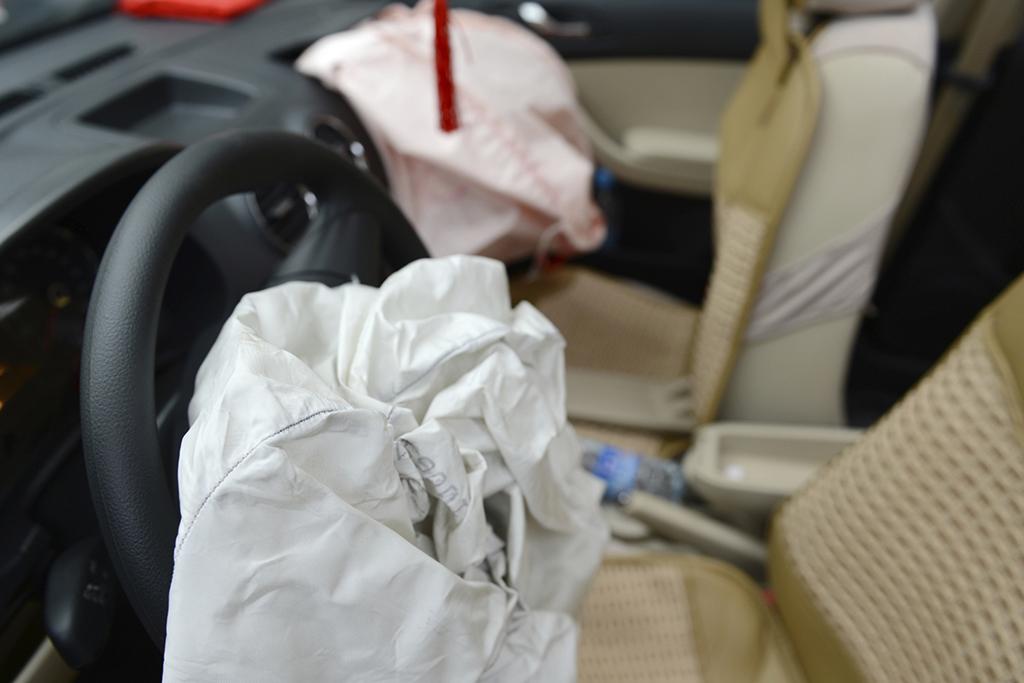
CARS.COM - Federal safety regulators today announced an agreement with Japan's Takata Corp. to recall an additional 35 to 40 million airbag inflators, more than doubling the ongoing Takata recall that already covers 28.8 million airbags in at least 24 million cars from a dozen automakers in the U.S. The massive and complicated recall already was the largest auto safety campaign in U.S. history and will take years to complete.
Related: Is Your Car Part of the Takata Recall?
At issue are faulty inflators that can explosively rupture upon deployment, propelling shrapnel from the airbag it inflates into vehicle occupants. So far, the defect has been linked to 10 deaths in the U.S. - the most recent is a Texas teenager killed in a Honda Civic in March - and scores of injuries.
Mark Rosekind, head of the National Highway Traffic Safety Administration, said at a press conference announcing the expansion that Honda, the automaker hardest hit by the airbag recall, today reported two more deaths in Malaysia, bringing the worldwide total to 13. He emphasized, however, that all known U.S. fatalities have been in cars already under recall.
In the latest expansion, Takata will recall all frontal airbag inflators using ammonium nitrate propellant not treated with a drying agent known as a desiccant. Rosekind said this expansion of the initial recall in November was ordered by NHTSA after its analysis of three investigations, including one by a coalition of 10 affected automakers who determined that the "root cause" of the inflator failures is a combination of age and exposure to prolonged heat and humidity.
While the latest action covers 35 to 40 million inflators, the exact number of vehicles newly affected is yet unknown, though it likely will be tens of millions. "Vehicle manufacturers own that number," said Rosekind, and automakers will determine the specific vehicles and notify owners. The government also maintains a tool at Safercar.gov where owners can look up open recalls by their car's vehicle identification number. He said information on cars affected by the latest Takata expansion would be added "in the coming weeks."
Rosekind said the new recall expansion will be done in phases from now through 2019 and some of the vehicles have been recalled previously. Some earlier recalls covered only one frontal airbag but not the other. Also, some recalled cars were fixed with a non-desiccated inflator and now will have to have the same airbag fixed again. NHTSA estimates that about 70 percent of replacement inflators now are being provided by other suppliers using a different propellant.
Rosekind said that of the three major factors contributing to inflator failure, "really critical is the time." He said that there is a "six-to-nine-year period before we start seeing ruptures." And he said NHTSA is close to creating a model that would allow it to determine the highest risks and prioritize which cars would be first in line for replacement as parts become available.
He said that he sympathizes with the frustration of owners waiting for parts, saying that he also owns a Takata recall vehicle. He recommends that owners check once a week with dealers. But in response to questions, he said that NHTSA has no authority to order recall loaners for owners who don't want to drive their cars.
The latest recall is an amendment to a consent order agreement between NHTSA and Takata in November 2015 calling for the end of production of ammonium nitrate inflators by 2018. Takata is the only airbag supplier using that propellant.
The agency also fined Takata $70 million for delays in reporting the problem, with a provision for an additional $130 million in fines if it fails to comply fully with the deal. The Justice Department also is conducting a criminal investigation.
The airbag recalls could eventually grow to include all Takata inflators using ammonium nitrate including those with a drying agent, which could involve nearly 70 million vehicles in the end. The deal with NHTSA gives Takata until 2019 to prove that its inflators with the drying agent are safe.
Rosekind said that all ammonium nitrate inflators remain under review and that all will be recalled unless Takata can demonstrate their safety. There have been no failures so far of inflators with the drying agent.
While most of the recall costs have been borne so far by the automakers, Takata recently set aside almost $200 million for recall expenses and with its survival in the balance, the company reportedly has been exploring a restructuring.
No comments:
Post a Comment